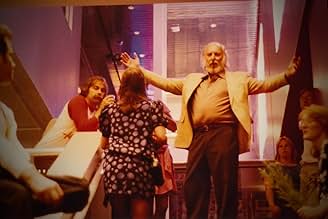Adicionar um enredo no seu idioma'All Things Must Pass' is a documentary that explores the rise and fall of Tower Records, and its legacy forged by its rebellious founder, Russ Solomon.'All Things Must Pass' is a documentary that explores the rise and fall of Tower Records, and its legacy forged by its rebellious founder, Russ Solomon.'All Things Must Pass' is a documentary that explores the rise and fall of Tower Records, and its legacy forged by its rebellious founder, Russ Solomon.
- Self - Singer-Songwriter
- (as Sir Elton John)
- Self - Russ's Wife
- (as Patti Drosins-Solomon)
Avaliações em destaque
With humble beginnings as little more than a lark, Tower Records began when Russ Solomon's dad decided to sell used 45 rpm singles in his cramped Sacramento drug store. He bought the singles for 3 cents and sold them for 10 cents. Within a few years, Russ purchased the record business from his dad, and proceeded to run it as only a rebellious kid from the 1960's could. From 1960 through 2000, the business grew each year. It expanded the number of stores (peaking at 192 worldwide) and constantly adjusted to the musical tastes and the delivery method – 45's, LP's, cassettes, CD's, etc.
Using some terrific photographs and video clips, accompanied by spot on music selections, director Hanks brilliantly and generously allows the actual players to tell the story. The expected celebrity drops are present, and even the words of David Geffen, Dave Grohl, Bruce Springsteen and Sir Elton John carry emotion. However, far and away the most impact comes from extended interviews with the unconventional and charismatic Tower Records founder Russ Solomon and his devoted and forthright employee team. Their sincere recollections provide the roadmap through the phenomenal growth, as well as the devastating end in 2006. We understand how these stores became so much more than retail outlets they were cultural hotspots for at least two generations. We also learn some things we probably shouldn't like the definition of "hand truck fuel", and the reason Russ installed hot lighting in the listening booths.
Mr. Hanks surprises with his ability to balance nostalgia and the harsh realities of the downfall of an iconic cultural business. The film captures the key role Tower Records, while also pointing out that the crash was due to more than just Napster and digital music delivery. An interesting case study for business majors highlights the importance of vision vs debt. For more insight from Colin Hanks, check out the interview from film critic Chase Whale: http://www.hammertonail.com/
"No Music. No Life". The motto of Tower Records was somehow inspirational, and fit perfectly for stores that featured mammoth album artwork on their store fronts, their own "Pulse" magazine, and staff that couldn't fathom life without music much less wearing a suit and tie to work. This was truly "a chain of independent stores", and trust me when I tell you that hanging out at Tower Records was more fun than having hundreds of cable channels.
Colin Hanks documentary examines the growth of this record chain from its early years from founder's Russ Solomon's dad's drug store where he had a section which sold records.
Russ took over the business in the 1960s, starting in the west coast and moving to the east coast and then internationally to Japan.
As is the case, these heady years of the counterculture was a supposedly drug and drink fuelled hazy party for the staff (it always seem to be the case with maverick start ups.) Live hard and party hard was the motto. The staff I saw in the 1990s seemed to be mainly bored teenagers on minimum wage.
At the turn of the millennium Tower Records was valued at $1 billion. Their seemed to be no end to its success and they were determined to sell albums, preferably CDs.
The impact of online shopping was a body blow. The Apple Store allowed you to buy singles you wanted for 99 cents. Tower Records wanted you to buy the whole album for an ever increasing price and their online servers was on AOL.
Even worse the young IT savvy consumer could now get music for free from Napster and other torrent sites. Combined with the company's debt laden expansion, choppy waters awaited them.
The documentary interviews key staff from the early days as well as the man himself Russ Soloman who comes across as a charismatic maverick. We also get to hear from musicians such as Dave Grohl, Elton John and Bruce Springsteen about their joy in visiting the Tower Record stores, browsing, talking to aficionados. Elton admits he spent a fortune in their shops.
The documentary was a bit messy, in fact a little overlong. We see a former executive being fired by a new management team and how Russ took him out for a meal after a Christmas party which bought him to tears. I wanted to know why he was fired, why he could not get another job, what happened after he went for a meal with Russ and then the same executive turns up later on when the attention shifts to the company's declining fortunes.
In fact seeing some of the staff being interviewed I was impressed how they managed to become so big, it seemed to be more by serendipity than design.
Despite each working for decades, adding up to centuries worth of experience, in a music-related field, it is notable that music - remember music? - is never a discussion point for these selfish greed heads, only the good times they enjoyed and the incredible profit they were making, both at the customer's expense.
Tower Records was a good store in spite of these people. Everyone loves music, all you needed to do was sell it to them at a reasonable price. See the Beatles' Apple Records for a similar example of what happens when you put burnt-out hippies in charge of your business. It's a shame alright, shameful actions.
Você sabia?
- CuriosidadesTo promote the release of the film, the still empty building which once housed the Tower Records on Sunset Blvd. in West Hollywood had its facade repainted to appear as it once had. This led to rumors that the store may reopen, but in fact the building had been sold to Gibson Guitars in 2014 with the intention of opening a guitar showroom, while preserving the historic building itself. Not yet ready to open their showroom, Gibson worked with the documentary makers to repaint the building to display the Tower facade. The repaint was planned to be taken down after the premiere party was held inside the empty building, but remained up for over a year while Gibson continued to plan their new store.
- Erros de gravaçãoIn the closing credits the Japanese Translator, Kyoko Nishijima, is listed twice.
- Citações
Dave Grohl, Himself: [Describing the cover of Nirvana's "Nevermind" LP] People went to great lengths. Like they'd get that weird foam and cardboard stuff and make a baby and there's a actual dollar bill dangling in front of it and it looks like water behind it. And, you know, when you would see people go to that much trouble for you, for your band, we were just, like, we were just shocked.
- ConexõesReferenced in Late Night with Seth Meyers: Carol Burnett/Colin Hanks/Baio/Abe Laboriel Jr. (2015)
Principais escolhas
- How long is All Things Must Pass?Fornecido pela Alexa
Detalhes
- Data de lançamento
- Países de origem
- Centrais de atendimento oficiais
- Idioma
- Também conhecido como
- All Things Must Pass
- Locações de filme
- 8801 Sunset Blvd West Hollywood, Califórnia, EUA(Tower Records Sunset Blvd. location)
- Empresas de produção
- Consulte mais créditos da empresa na IMDbPro
Bilheteria
- Faturamento bruto nos EUA e Canadá
- US$ 172.394
- Fim de semana de estreia nos EUA e Canadá
- US$ 19.001
- 18 de out. de 2015
- Faturamento bruto mundial
- US$ 172.394
- Tempo de duração1 hora 34 minutos
- Cor
- Proporção
- 1.78 : 1
Contribua para esta página
















